10th February 2015
Golden Opportunities or Last Chance Saloon? The OECD & Development in 2015
This week a colleague said something that really resonated with me: “We are the first generation in history that could end extreme poverty, and the last generation that still has time to avert extreme climate change”.
No pressure then.
It’s certainly both an exciting and sobering prospect. We live in an era of such great promise while also facing possible irreversible disaster. We have the resources, knowledge, and methods to transform our approach, but only if we act collectively and quickly.
2015 has been dubbed the ‘Year of Development’ for good reason, with at least three major intergovernmental events.
In September, the UN General Assembly will formally adopt the post-2015 Sustainable Development Goals (SDGs). This new set of goals will build on the ‘unfinished business’ of the Millennium Development Goals (MDGs) and aim to eliminate extreme poverty, boost economic growth, and protect the environment, in order to move us towards a fairer, more peaceful world. These new goals will also be universal. While the MDGs were targeted mostly to the developing world, the SDGs will apply to every country in the world.
Ahead of September, there will be a July Financing for Development (FfD) conference in Addis Ababa, which will bring the international community together to debate the ‘Means of Implementation’ and the financing angles.
Finally, the year will culminate in Paris in December, as the city hosts the COP 21 climate summit: ‘last chance saloon’ for agreeing a legally-binding, universal climate change action plan.
These three events are very closely linked. Without the financing measures in place, the goals cannot be implemented, and without action on climate change, our ability to deliver on post-2015 goals will be severely impeded. One key factor is that development finance is no longer just about traditional Overseas Development Aid (ODA). It will be a mix of public and private finance, and countries’ own domestic resource mobilisation that will be needed to achieve the SDGs. The resources exist: we just need the political partnership and economic incentives to target investment in the right areas.
At the same time, it is crucial to maintain ODA, particularly for the world’s least developed countries and states affected by conflict. I am proud that the UK has met its target of directing 0.7% of gross national income to ODA, and we encourage others to meet this target too.
On the relationship with climate change, it is precisely the poorest countries will be hit the hardest by rising temperatures and extreme weather – with potential migration and humanitarian crises that could dwarf current trends.
What can the OECD do to support the global summit in September? Key inputs could be on development finance, tax (BEPS), aid for trade, illicit financial flows and domestic resource mobilisation. All can help achieve the post-2015 framework.
Last but not least, at a time when people all around the world face a daily struggle to make ends meet, and government finances are stretched, it is vital to show what difference all this money and effort is making. That it’s being spent effectively and transparently. This is also a communications challenge given we are likely to have 17 SDGs, compared to 8 MDGs. Again, the OECD may be able to help on effective target-setting and monitoring.
Two months into the ‘Year of Development’ we have a duty to work collectively and boldly over the next 10 months to ensure 2015 sees a historic step forward in tackling extreme poverty and putting our economies on a sustainable footing.

Well done on your excellent work in the office for economic development.
I wanted to acknowledge your hard earned success.
Duck Worth Lewis Method.
I know you will appreciate our music. X
This practical clear and positive challenge should inspire responsible people in public and political service. We can hope the private sector and students also understand what economics can really be about.